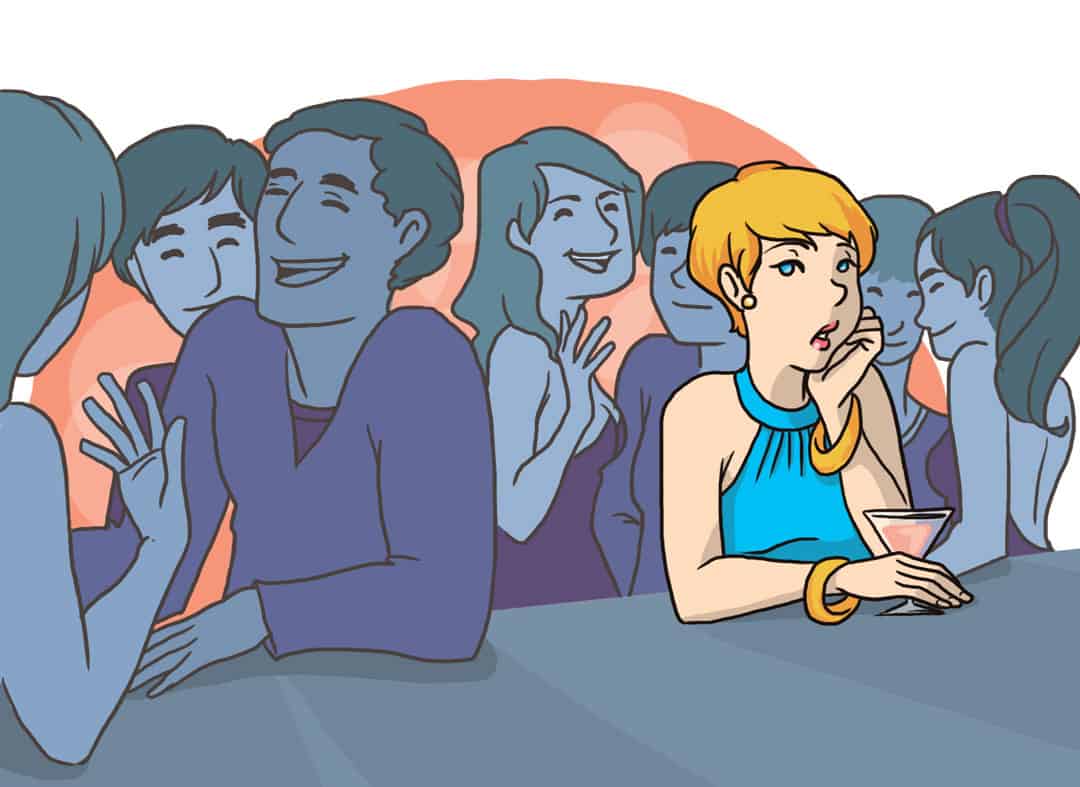Have you ever tried to “talk” a woman into feeling love for you? I’ll tell you what, I’ve been in that situation many times, falling deeply for a girl and finally gathering up the courage to tell her, just to fall flat on my butt with it. I learned the hard way that no argument in the world will get a girl to like me: rationale will never trigger emotion. Sure, a woman may decide to marry a rich man, but that doesn’t mean love is involved. On the other hand, she may fall desperately for the poorest sitar player because he’s highly intelligent. If you improve your emotional intelligence, you’ll build a deeper connection with women and significantly enhance your love life.
When he released his bestselling book Emotional Intelligence in 1995, the psychologist Daniel Goleman brought the notion to massive mainstream attention. Here’s a definition he gave in 1998: “Emotional Intelligence refers to the capacity for recognizing our own feelings and those of others, for motivating ourselves, and for managing emotions well in ourselves and our relationships.” His main argument is that emotional-intelligence stands beside the classic cognitive intelligence and has a major influence on how a person will shape their life.
In other words, IQ and Emotional Intelligence are two separate forces working together to dictate how you’ll behave. Even though you might KNOW you should do something, you might not because of emotional intelligence.
I will share three ideas with you today that will help your success with women.
Pick up on her feelings
We marvel at the mannerisms of our dogs and cats, go to the zoo to watch how exotic animals behave, or even take an expensive holiday to go “whale-watching”. We take all this time studying other species, but do you ever “people-watch”? It’s a rewarding activity. In the streets, at your workplace, in the subway: observe the interactions of your fellow human beings. How do lovers display their affection, how do they make each other smile? How do friends behave, what kind of attitude does the business guy give his colleague?
You can learn from these things. You can learn about yourself. Now, when you interact with a woman, you can tell more and more accurately how she’s feeling and what her reactions mean. You can also call her on them: “I notice you don’t feel comfortable. Let’s change the subject.” or “glad I made you smile. Seems like you love chocolate.”
Delay gratification.
Goleman explains that the ability to wait for goodies can be directly connected to success in life. Well, I’m sure we can both think of numerous goodies you’ll want from a woman: your best bet to get them is taking it one step at a time. Women will appreciate you for being able to wait, and there’s a good chance you will reap strong rewards for doing so.
One of the more attractive qualities of a man is that he can delay gratification. Showing that you can wait in spite of wanting immediate gratification demonstrates willpower and that you are not needy.
Start thinking with your heart.
Ever watch Moulin Rouge? Remember that one line? “The greatest thing you’ll ever learn is to discuss the personal advantages of selecting a well-bred, healthy male with a solid income, the best of intentions, well-refined taste, good attire and exquisite manners”? You don’t? Well I don’t either. That’s because the line actually says “The greatest thing you’ll ever learn is just to love and to be loved in return.” That’s what women fall for!
Don’t offer her gifts, stability or intellectual conversation.
Offer her love. Passion.
How do you do that when you’re at some café with her? Well, first of all, you pick a place that has comfy seating, like sofas. Then, don’t sit opposite her. Sit next to her, so you can:
– Whisper in her ear
– Take her hand when you’re making a point
– Touch her shoulders or knees
Introduce the emotions you are looking for into the conversation. Remember, she’s a woman and you’re a man, and you’re not there to discuss algebra. Cut out the superficial small talk early on and focus on having a meaningful conversation that gets to the core of beauty, truth, and love. It helps to keep an eye out for these things in your every day life, too: by finding beauty in each little event, you strip away some of the phony clutter that clouds your days and turn your life into a more pure, genuine experience.
Demonstrate a masterful control of your emotions, start observing other people’s behavior as well as your own: learn to recognize emotions and react appropriately to them. These relationship hacks will significantly improve your love life. It’s a skill, much like attentiveness for beauty in everyday scenes, or patience.
1. What is emotional intelligence and how can it help improve my love life?
Emotional intelligence (EI) is the capacity to be aware of and manage one’s own emotions, and the emotions of others.
There are a few key things that emotional intelligence can do for your love life. First, it can help you to be more self-aware. This means that you’ll be better able to understand your own emotions, and what triggers them.
2. How can I become more emotionally intelligent?
The first step is to be aware of your emotions. Pay attention to how you feel when you’re around different people and in different situations. Do you tend to feel happy, sad, anxious, or angry?
Once you’re aware of your emotions, start to label them. This will help you better understand what you’re feeling and why. For example, if you’re feeling angry, is it because someone hurt your feelings or because you’re stressed out?
3. What are some specific things I can do to become more emotionally intelligent in my relationship?
1. One specific thing you can do to become more emotionally intelligent in your relationship is to be more aware of your partner’s emotional needs and respond to them in a way that is supportive and helpful. This may involve being more attuned to their body language and nonverbal cues, as well as being more responsive to their verbal communication.
2. Another specific thing you can do to become more emotionally intelligent in your relationship is to work on developing a greater sense of empathy.
4. How can I use emotional intelligence to better understand my partner?
There are many ways to use emotional intelligence to better understand your partner. One way is to be aware of your partner’s emotional triggers and what sets them off. Another way is to be aware of your partner’s love language and how they express love. You can also use emotional intelligence to better understand your partner’s needs and how to meet those needs. Lastly, you can use emotional intelligence to resolve conflict in a relationship.
5. How can I use emotional intelligence to communicate better with my partner?
When it comes to communicating with your partner, emotional intelligence can go a long way. Here are a few tips:
1. Pay attention to your partner’s nonverbal cues. This includes their body language, tone of voice, and facial expressions. These can give you clues as to how your partner is feeling, even if they’re not saying anything.
2. Try to see things from your partner’s perspective.
6. How can emotional intelligence help me resolve conflict in my relationship?
When it comes to resolving conflict in a relationship, emotional intelligence can be a powerful tool. By definition, emotional intelligence is the ability to be aware and understand your own emotions and the emotions of others. When it comes to conflict resolution, this means being able to understand what is causing the conflict and finding a way to resolve it in a way that is respectful and beneficial to both parties involved.
There are many different ways that emotional intelligence can help resolve conflict in a relationship.
7. How can I use emotional intelligence to create a more fulfilling and satisfying relationship?
Be aware of your own emotions. This is the first step to being emotionally intelligent. If you’re not aware of your own emotions, it will be difficult to manage them effectively. Pay attention to how you’re feeling and why.
8. What are some common mistakes people make when trying to improve their love life with emotional intelligence?
One of the most common mistakes people make when trying to improve their love life with emotional intelligence is that they try to change their partner instead of themselves. It is important to remember that you cannot change another person, only yourself. If you want your partner to be more emotionally intelligent, you need to model the behavior yourself. Another common mistake is to try and fix everything that is wrong in the relationship. This is not only impossible, but it is also not necessary.
9. How can I avoid making these mistakes?
The first step is to become aware of the mistakes you tend to make. Once you know what they are, you can start to work on avoiding them.
One mistake that many people make is procrastinating. They put off doing things that they know they need to do, and as a result, they end up making more mistakes. If you find yourself procrastinating, try to force yourself to start working on the task at hand.
10. What are some other resources I can turn to for help in improving my love life with emotional intelligence?
Read books or articles on the topic. There are many great books and articles out there that can teach you about emotional intelligence and how to use it in your relationships.
What actually is meant by emotional intelligence'?
There are 4 basic components:
1) Self Awareness - How aware you are of what you are feeling when and why.
2) Self Management - How actively you are able to manage your behavior and emotions with intent and purpose.
3) Social awareness - How are you are of what others are feeling and why.
4) Social Management - How actively you are able to act to address other people's emotions intentionally and effectively.
This is becoming a critical set of career skills, FYI. High emotional intelligence correlates very closely with strong work performance, whereas high traditional intelligence actually has a very poor correlation with strong work performance.
How have intps worked on their emotional intelligence?
Yes,
For me I approached it like one would approach learning a language. I started watching more drama movies, did people watching, paid attention to how people interacted at my university/work, etc. Then I forced myself to be in more social situations of varying degrees: Took up a small event organization job, asked people about their day and was genuinely curious about them. Then I started keeping in touch with people more, and from there was able to grow friendships with people who could appreciate me for whatever sort of human I am.
It's a process that is 6 years in the making so far, but it's fairly interesting. I still don't really understand everything emotional, but it's fun to examine, engage, and personally develop. Not understanding is one of the fun parts of it really, maybe that's why it's so interesting.
It's like people exploring, and you get to reverse engineer peoples' brains and try to uncover what *really* makes them tick. I've gained a greater appreciation for human psychology through this as well.
Do you feel that people lack emotional intelligence in dubai?
Yes, generally. Look at the way people drive like maniacs with no regard for the safety of anyone else. Look at the way people treat those with less money or a different nationality. Look at the shameless materialism. Look at the way people turn up to meetings and appointments whenever they damn well feel like it because their time is more important. Look at the way people run to the police the moment someone looks at them the wrong way. Look at the way many bosses make their employees work excessive hours and shout at them to make them "work better."
If people don't ever grow up, the progress of this country will be limited.
How do you improve emotional intelligence or emotional availability?
>I recently got a stress-induced illness without even admitting to myself that I was stressed.
At that level of emotional distance you should see a counselor. Because it's not that you're in touch with your emotions but private - you're not aware of what your emotionally experiencing and that's an additional obstacle.


















